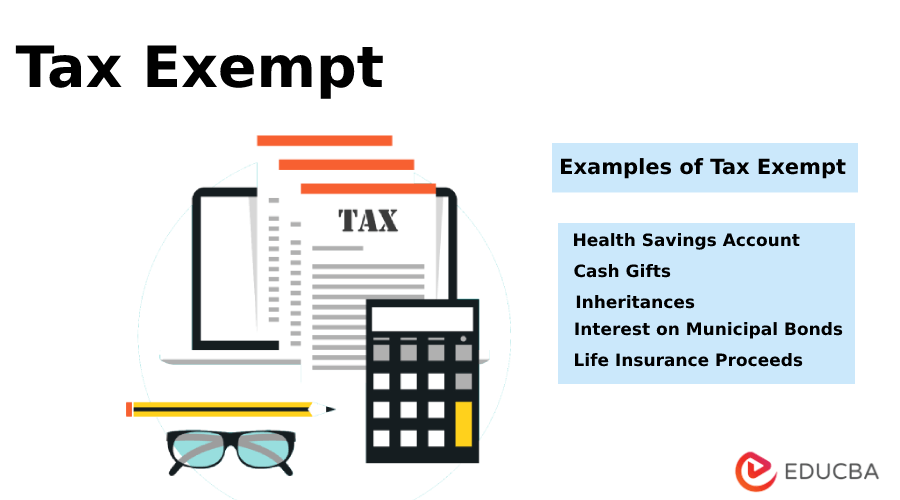Definition of Tax Exempt
Tax-exempt refers to those incomes or transactions exempted from the levy of state, local, or federal taxes. Governments may sometimes provide relief from taxation on specific items, and the taxpayer is not required to pay any tax on such things; such objects are known as tax-exempt.
Further, particular organizations or businesses may also be “tax-exempt,” meaning they are not liable for paying taxes subject to certain conditions.
Explanation
Tax-exempt is a status given to certain persons or organizations to exclude certain income from the taxes levied by federal or state governments. If any item of income is declared as tax-exempt by the government, then the taxpayer is relieved from the obligation to pay tax on such an income. Such tax-exempt incomes are not relevant for tax calculations and are only reported in the tax returns for informational purposes. The tax exemption may either be complete without any limit or available only up to a specific limit beyond which the taxes might apply.
Apart from declaring certain items as tax-exempt, the IRS may also accord the status of “tax-exempt” to specific organizations such as charitable organizations, the result of which is that these organizations are exempt from federal income taxes provided they meet specific requirements as may be prescribed.
Examples of Tax Exempt
Let us have a look at a few examples of tax-exempt items.
- Health Savings Account: Distributions made from a health savings account are tax-exempt if the proceeds are utilized for qualified expenses only.
- Cash Gifts: The cash gifts made within the threshold of $15,000 per person are tax-exempt in the hands of the giver. If a person makes a gift over $15,000 per person, then such a giver becomes liable for gift tax.
- Inheritances: The inheritances received from a person is tax-exempt up to the limit of $11.58 million. Any amount received in excess shall attract a tax levy.
- Interest on Municipal Bonds: Interest earned on municipal bonds is tax-exempt on a federal level. The interest is tax-exempt on a state or local level if the taxpayer resides in the same state where the bonds are issued.
- Life Insurance Proceeds: The amounts received to the nominee as the life insurance proceeds are tax-exempt, subject to certain exceptions.
Tax-Exempt Interest
Interest earned on municipal bonds is one of the most common tax-exempt incomes. Municipal bonds are the bonds issued by states to arrange capital for special projects and ventures such as the construction of schools, bridges, etc. The interest income earned by an investor from the municipal bonds issued in the state of residence of the investor becomes exempt from federal and state taxes. This means that the investor doesn’t need to pay tax on such interest income, and the post-tax returns remain the same as the pre-tax returns.
Importance of Tax Exempt
The importance of tax-exempt transactions is that no tax is levied on such a transaction either by the state government or federal government. The governments provide tax exemptions without any conditions or thresholds or sometimes with requirements or thresholds. When these conditions and thresholds are complied with, taxpayers would not be required to pay tax on tax-exempt transactions.
Even though any income is tax-exempt, it would still be required to be reported in the taxpayer’s tax return. This means that although the amount of tax-exempt income doesn’t form part of tax calculations, it still has to be reported as an exempt item in the taxpayers’ tax returns for transparency and fair reporting.
Advantages of Tax-Exempt
Earning a tax-exempt income or having a tax-exempt status offers the following benefits:
- In the case of investments, the post-tax returns are improved since no tax levy is imposed.
- The taxpayers’ savings increase, leaving them with more disposable incomes.
- The tax burden on the taxpayers is reduced, encouraging them not to hide their incomes or understate them.
- Giving the status of tax-exempt to organizations such as charitable organizations is good from a socio-economic aspect since they are doing for the general welfare of society.
Disadvantages of Tax Exempt
Allowing tax-exempt status to incomes or organizations has some disadvantages as below:
- Tax-exempt income is still required to be reported in tax returns. If a taxpayer only earns tax-exempt income, it may become unnecessary to file the tax return only for tax-exempt income.
- Sometimes, tax exemption is granted only upon the fulfillment of certain conditions. The costs involved in the completion of such requirements may be high.
- The government loses its share of revenue it could have earned if the tax exemption had not been given.
- Some taxpayers may benefit from exemption even when the conditions attached to it are not met.
Conclusion
You must not forget to report tax-exempt income in your tax returns even if you don’t have any other income in your tax returns. Further, when claiming any tax exemption, ensure you fulfill all the conditions attached to it. Otherwise, you might land in trouble later.
Recommended Articles
This is a guide to Tax Exempt. Here we also discuss the definition and examples of tax-exempt along with its advantages and disadvantages. You may also have a look at the following articles to learn more –


